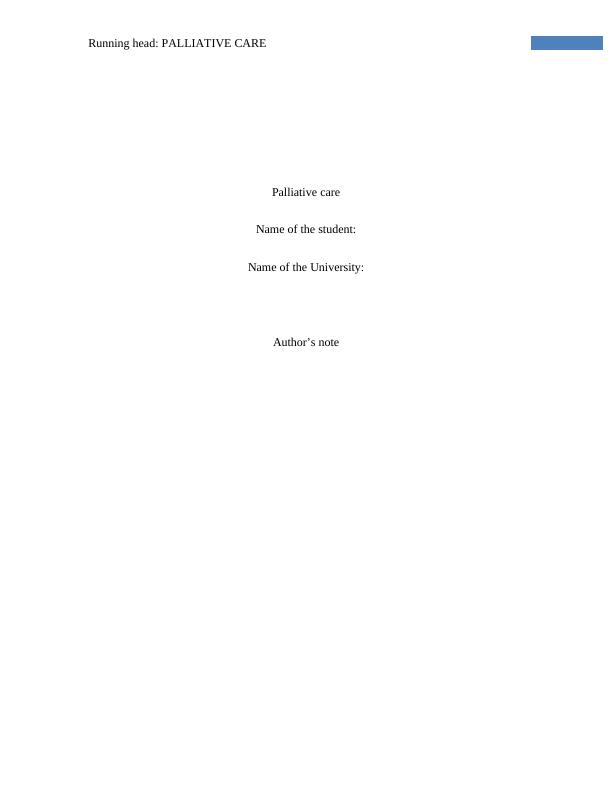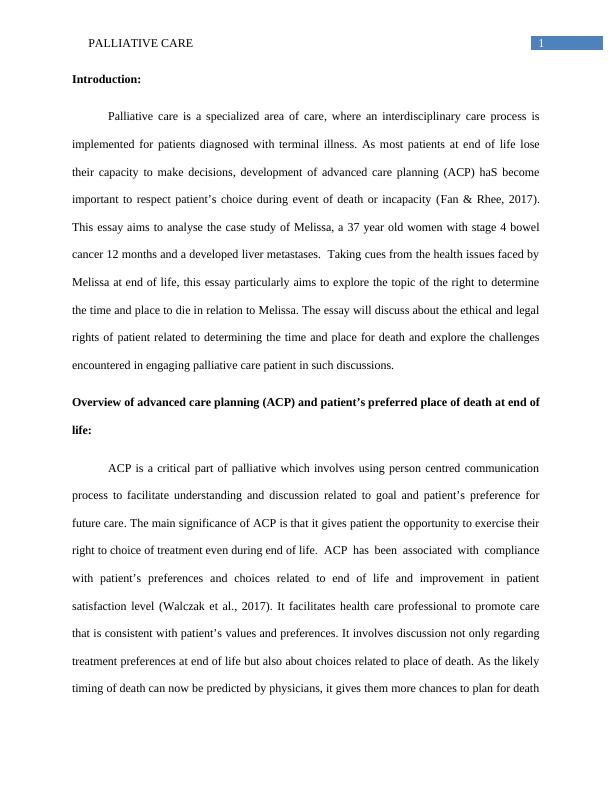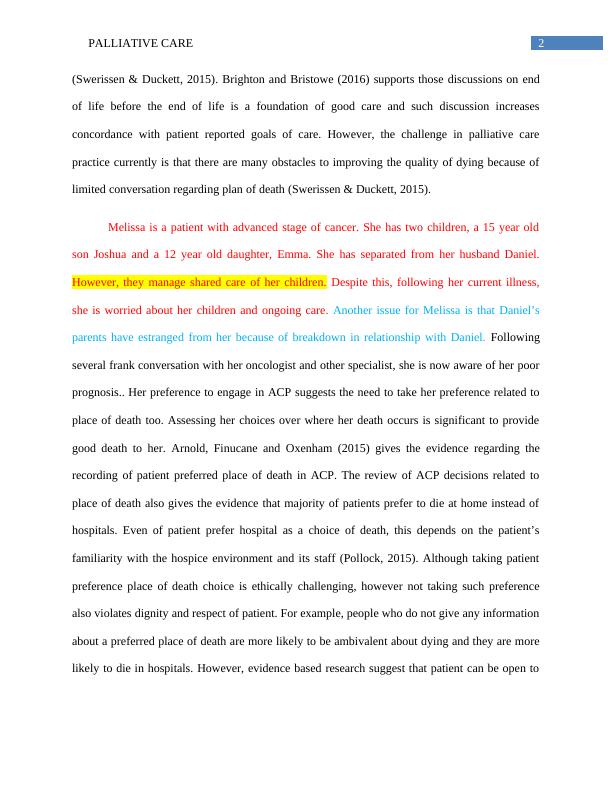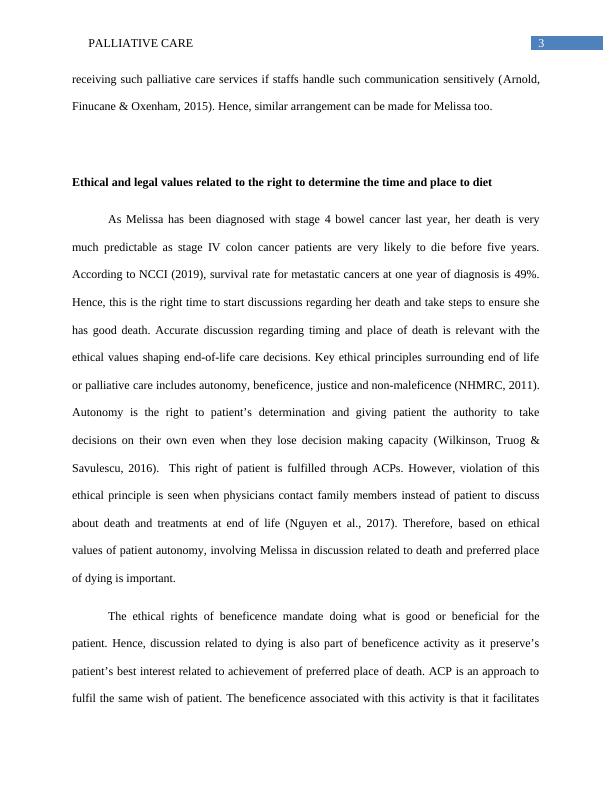Palliative Care Assignment 2022
Assignment 3 for the NURS1137 Palliative Care course. The assignment is a case study on a 37-year-old woman with stage 4 bowel cancer.
12 Pages3204 Words18 Views
Added on 2022-10-11
Palliative Care Assignment 2022
Assignment 3 for the NURS1137 Palliative Care course. The assignment is a case study on a 37-year-old woman with stage 4 bowel cancer.
Added on 2022-10-11
ShareRelated Documents
Running head: PALLIATIVE CARE
Palliative care
Name of the student:
Name of the University:
Author’s note
Palliative care
Name of the student:
Name of the University:
Author’s note

1PALLIATIVE CARE
Introduction:
Palliative care is a specialized area of care, where an interdisciplinary care process is
implemented for patients diagnosed with terminal illness. As most patients at end of life lose
their capacity to make decisions, development of advanced care planning (ACP) haS become
important to respect patient’s choice during event of death or incapacity (Fan & Rhee, 2017).
This essay aims to analyse the case study of Melissa, a 37 year old women with stage 4 bowel
cancer 12 months and a developed liver metastases. Taking cues from the health issues faced by
Melissa at end of life, this essay particularly aims to explore the topic of the right to determine
the time and place to die in relation to Melissa. The essay will discuss about the ethical and legal
rights of patient related to determining the time and place for death and explore the challenges
encountered in engaging palliative care patient in such discussions.
Overview of advanced care planning (ACP) and patient’s preferred place of death at end of
life:
ACP is a critical part of palliative which involves using person centred communication
process to facilitate understanding and discussion related to goal and patient’s preference for
future care. The main significance of ACP is that it gives patient the opportunity to exercise their
right to choice of treatment even during end of life. ACP has been associated with compliance
with patient’s preferences and choices related to end of life and improvement in patient
satisfaction level (Walczak et al., 2017). It facilitates health care professional to promote care
that is consistent with patient’s values and preferences. It involves discussion not only regarding
treatment preferences at end of life but also about choices related to place of death. As the likely
timing of death can now be predicted by physicians, it gives them more chances to plan for death
Introduction:
Palliative care is a specialized area of care, where an interdisciplinary care process is
implemented for patients diagnosed with terminal illness. As most patients at end of life lose
their capacity to make decisions, development of advanced care planning (ACP) haS become
important to respect patient’s choice during event of death or incapacity (Fan & Rhee, 2017).
This essay aims to analyse the case study of Melissa, a 37 year old women with stage 4 bowel
cancer 12 months and a developed liver metastases. Taking cues from the health issues faced by
Melissa at end of life, this essay particularly aims to explore the topic of the right to determine
the time and place to die in relation to Melissa. The essay will discuss about the ethical and legal
rights of patient related to determining the time and place for death and explore the challenges
encountered in engaging palliative care patient in such discussions.
Overview of advanced care planning (ACP) and patient’s preferred place of death at end of
life:
ACP is a critical part of palliative which involves using person centred communication
process to facilitate understanding and discussion related to goal and patient’s preference for
future care. The main significance of ACP is that it gives patient the opportunity to exercise their
right to choice of treatment even during end of life. ACP has been associated with compliance
with patient’s preferences and choices related to end of life and improvement in patient
satisfaction level (Walczak et al., 2017). It facilitates health care professional to promote care
that is consistent with patient’s values and preferences. It involves discussion not only regarding
treatment preferences at end of life but also about choices related to place of death. As the likely
timing of death can now be predicted by physicians, it gives them more chances to plan for death

2PALLIATIVE CARE
(Swerissen & Duckett, 2015). Brighton and Bristowe (2016) supports those discussions on end
of life before the end of life is a foundation of good care and such discussion increases
concordance with patient reported goals of care. However, the challenge in palliative care
practice currently is that there are many obstacles to improving the quality of dying because of
limited conversation regarding plan of death (Swerissen & Duckett, 2015).
Melissa is a patient with advanced stage of cancer. She has two children, a 15 year old
son Joshua and a 12 year old daughter, Emma. She has separated from her husband Daniel.
However, they manage shared care of her children. Despite this, following her current illness,
she is worried about her children and ongoing care. Another issue for Melissa is that Daniel’s
parents have estranged from her because of breakdown in relationship with Daniel. Following
several frank conversation with her oncologist and other specialist, she is now aware of her poor
prognosis.. Her preference to engage in ACP suggests the need to take her preference related to
place of death too. Assessing her choices over where her death occurs is significant to provide
good death to her. Arnold, Finucane and Oxenham (2015) gives the evidence regarding the
recording of patient preferred place of death in ACP. The review of ACP decisions related to
place of death also gives the evidence that majority of patients prefer to die at home instead of
hospitals. Even of patient prefer hospital as a choice of death, this depends on the patient’s
familiarity with the hospice environment and its staff (Pollock, 2015). Although taking patient
preference place of death choice is ethically challenging, however not taking such preference
also violates dignity and respect of patient. For example, people who do not give any information
about a preferred place of death are more likely to be ambivalent about dying and they are more
likely to die in hospitals. However, evidence based research suggest that patient can be open to
(Swerissen & Duckett, 2015). Brighton and Bristowe (2016) supports those discussions on end
of life before the end of life is a foundation of good care and such discussion increases
concordance with patient reported goals of care. However, the challenge in palliative care
practice currently is that there are many obstacles to improving the quality of dying because of
limited conversation regarding plan of death (Swerissen & Duckett, 2015).
Melissa is a patient with advanced stage of cancer. She has two children, a 15 year old
son Joshua and a 12 year old daughter, Emma. She has separated from her husband Daniel.
However, they manage shared care of her children. Despite this, following her current illness,
she is worried about her children and ongoing care. Another issue for Melissa is that Daniel’s
parents have estranged from her because of breakdown in relationship with Daniel. Following
several frank conversation with her oncologist and other specialist, she is now aware of her poor
prognosis.. Her preference to engage in ACP suggests the need to take her preference related to
place of death too. Assessing her choices over where her death occurs is significant to provide
good death to her. Arnold, Finucane and Oxenham (2015) gives the evidence regarding the
recording of patient preferred place of death in ACP. The review of ACP decisions related to
place of death also gives the evidence that majority of patients prefer to die at home instead of
hospitals. Even of patient prefer hospital as a choice of death, this depends on the patient’s
familiarity with the hospice environment and its staff (Pollock, 2015). Although taking patient
preference place of death choice is ethically challenging, however not taking such preference
also violates dignity and respect of patient. For example, people who do not give any information
about a preferred place of death are more likely to be ambivalent about dying and they are more
likely to die in hospitals. However, evidence based research suggest that patient can be open to

3PALLIATIVE CARE
receiving such palliative care services if staffs handle such communication sensitively (Arnold,
Finucane & Oxenham, 2015). Hence, similar arrangement can be made for Melissa too.
Ethical and legal values related to the right to determine the time and place to diet
As Melissa has been diagnosed with stage 4 bowel cancer last year, her death is very
much predictable as stage IV colon cancer patients are very likely to die before five years.
According to NCCI (2019), survival rate for metastatic cancers at one year of diagnosis is 49%.
Hence, this is the right time to start discussions regarding her death and take steps to ensure she
has good death. Accurate discussion regarding timing and place of death is relevant with the
ethical values shaping end-of-life care decisions. Key ethical principles surrounding end of life
or palliative care includes autonomy, beneficence, justice and non-maleficence (NHMRC, 2011).
Autonomy is the right to patient’s determination and giving patient the authority to take
decisions on their own even when they lose decision making capacity (Wilkinson, Truog &
Savulescu, 2016). This right of patient is fulfilled through ACPs. However, violation of this
ethical principle is seen when physicians contact family members instead of patient to discuss
about death and treatments at end of life (Nguyen et al., 2017). Therefore, based on ethical
values of patient autonomy, involving Melissa in discussion related to death and preferred place
of dying is important.
The ethical rights of beneficence mandate doing what is good or beneficial for the
patient. Hence, discussion related to dying is also part of beneficence activity as it preserve’s
patient’s best interest related to achievement of preferred place of death. ACP is an approach to
fulfil the same wish of patient. The beneficence associated with this activity is that it facilitates
receiving such palliative care services if staffs handle such communication sensitively (Arnold,
Finucane & Oxenham, 2015). Hence, similar arrangement can be made for Melissa too.
Ethical and legal values related to the right to determine the time and place to diet
As Melissa has been diagnosed with stage 4 bowel cancer last year, her death is very
much predictable as stage IV colon cancer patients are very likely to die before five years.
According to NCCI (2019), survival rate for metastatic cancers at one year of diagnosis is 49%.
Hence, this is the right time to start discussions regarding her death and take steps to ensure she
has good death. Accurate discussion regarding timing and place of death is relevant with the
ethical values shaping end-of-life care decisions. Key ethical principles surrounding end of life
or palliative care includes autonomy, beneficence, justice and non-maleficence (NHMRC, 2011).
Autonomy is the right to patient’s determination and giving patient the authority to take
decisions on their own even when they lose decision making capacity (Wilkinson, Truog &
Savulescu, 2016). This right of patient is fulfilled through ACPs. However, violation of this
ethical principle is seen when physicians contact family members instead of patient to discuss
about death and treatments at end of life (Nguyen et al., 2017). Therefore, based on ethical
values of patient autonomy, involving Melissa in discussion related to death and preferred place
of dying is important.
The ethical rights of beneficence mandate doing what is good or beneficial for the
patient. Hence, discussion related to dying is also part of beneficence activity as it preserve’s
patient’s best interest related to achievement of preferred place of death. ACP is an approach to
fulfil the same wish of patient. The beneficence associated with this activity is that it facilitates

End of preview
Want to access all the pages? Upload your documents or become a member.
Related Documents
Palliative care for Stage Four Colorectal Metastatic Cancer and role of Passive Euthanasia in Dying Essay 2022lg...
|10
|3333
|20
Advance Care Practice and Patient Autonomylg...
|10
|2976
|2
Benefits and Preparation of Advanced Care Planning for Palliative Care Patientslg...
|11
|2799
|171
Palliative Care for a Cancer Patient Research Paper 2022lg...
|13
|3482
|27
Assignment | Determining Time and Placelg...
|9
|2848
|23
Assessment 3: Advance Care Planninglg...
|11
|3170
|440
